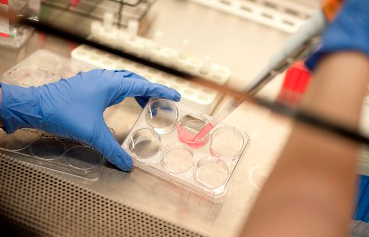Researchers in the US and Japan have developed a revolutionary new technique for creating pluripotent stem cells by exposing mature cells to environmental stress.
 The process could be faster and cheaper than existing methods that require manipulation of genes inside a cell’s nucleus.
The process could be faster and cheaper than existing methods that require manipulation of genes inside a cell’s nucleus.
Our colleagues from the UK SMC rounded up comment from UK-based experts.
The SMC’s previous output on induced pluripotent stem cells can be seen here.
See also a more general Briefing Note on human stem cells.
Expert reaction to two papers describing a new way to induce pluripotent stem cells in mice, as published in Nature*
Professor Robin Lovell-Badge, Head of Division of Stem Cell Biology and Developmental Genetics, MRC-NIMR, comments:
“The reprogramming induced by low pH is remarkable. It does not give cells that are the same as ES cells or iPS cells, indeed the STAP cells should not really be called stem cells as they have limited self-renewal ability (unlike both ES and iPS cells) – a key property of stem cells. Moreover they have a number of different properties in comparison to ES and iPS cells with respect to their expression of characteristic genes and the range of cell types they can give rise to on differentiation, nevertheless, they appear to possess at least some properties associated with pluripotency. The demonstration that they can be further tweaked into a state that more closely resembles that of ES and iPS cells is therefore also important.
“It is going to be a while before the nature of these cells are understood, and whether they might prove to be useful for developing therapies, but the really intriguing thing to discover will be the mechanism underlying how a low pH shock triggers reprogramming. And why it does not happen when we eat lemon or vinegar or drink cola?”
Prof Fiona Watt, Director of the Centre for Stem Cells and Regenerative Medicine, Kings College London, comments:
“These papers report the remarkable finding that blood cells can be converted to pluripotent cells by transiently exposing them to low pH conditions. The resulting pluripotent cells differ from embryonic stem cells in several respects, notably because they have a limited ability to self-renew and can contribute to both embryonic tissues and placenta, whereas embryonic stem cells do not contribute to placenta. The studies have been carried out with mouse cells and it will be very interesting to know whether the observations hold true for human cells.”
Dr Dusko Ilic, Reader in Stem Cell Science, Kings College London, comments:
“The papers from RIKEN Centre for Developmental Biology in Kobe, Japan, and their American collaborators describe a major scientific discovery and they will be opening a new era in stem cell biology. Mimicking what is happening in plants, the authors have demonstrated that environmental clues are sufficient to change cell fate, not only in plants but also in mammals. Exposing briefly cells from a newborn mouse to the right environment can change them so profoundly that they can adopt characteristics of embryonic stem cells and be used to construct an entire mouse embryo.
“Whether human cells would respond in a similar way to comparable environmental clues, it stills remains to be shown. I am sure that the group is working on this and I would not be surprised if they succeed even within this calendar year.
“The approach is indeed revolutionary. It will make fundamental change in a way how scientists perceive the interplay of environment and genome. However, even as being attractive as it sounds, it would not change much in a way how the stem cells are translated to clinic. It does not bring stem cell-based therapy closer. We will need to use the same precautions for the cells generated in this way as for the cells isolated from embryos or reprogrammed with a standard method. ”
Prof Chris Mason, Chair of Regenerative Medicine Bioprocessing, University College London, comments:
“Obakata’s approach in the mouse is the most simple, lowest cost and quickest method to generate pluripotent cells from mature cells. If it works in man, this could be the game changer that ultimately makes a wide range of cell therapies available using the patient’s own cells as starting material – the age of personalised medicine would have finally arrived.
“Once again Japanese scientists have unexpectedly rewritten the rules on making pluripotent cells from adult cells, in 2006 Yamanaka used four genes (iPS cells) and now the far simpler and quicker route discovered by Obokata that requires only transient exposure of adult cells to an acidic solution. How much easier can it possibly get…
“Who would have thought that to reprogram adult cells to an embryonic stem cell-like (pluripotent) state just required a small amount of acid for less than half an hour – an incredible discovery.
“For potential medical use, stimulus-triggered acquisition of pluripotency (STAP) cells will not immediately replace human induced pluripotent stem (iPS) cells discovered in 2007, just as iPS cells have not replaced human embryonic stem (ES) cells discovered in 1998. Every breakthrough has to catch up with the years of accumulated scientific and clinical knowledge that the earlier discovery has generated. However this knowledge pool accelerates the development of later discoveries enabling game-changing technologies to progress faster to the clinic. For example, it took human ES cells 12 years before their first use in man but only 6 years for human iPS cells. Given the substantial overlap between all three technologies, it is likely that this will shorten the development pathway for STAP cells, however, it will still be many years before the technology could potentially be in everyday clinical practice.”
* ‘Stimulus-triggered fate conversion of somatic cells into pluripotency’ & ‘Bidirectional developmental potential in reprogrammed cells with acquired pluripotency’ by Obakata et al. will both be published in Nature at 18:00 UK time on Wednesday 29 January, which is when the embargo will lift.